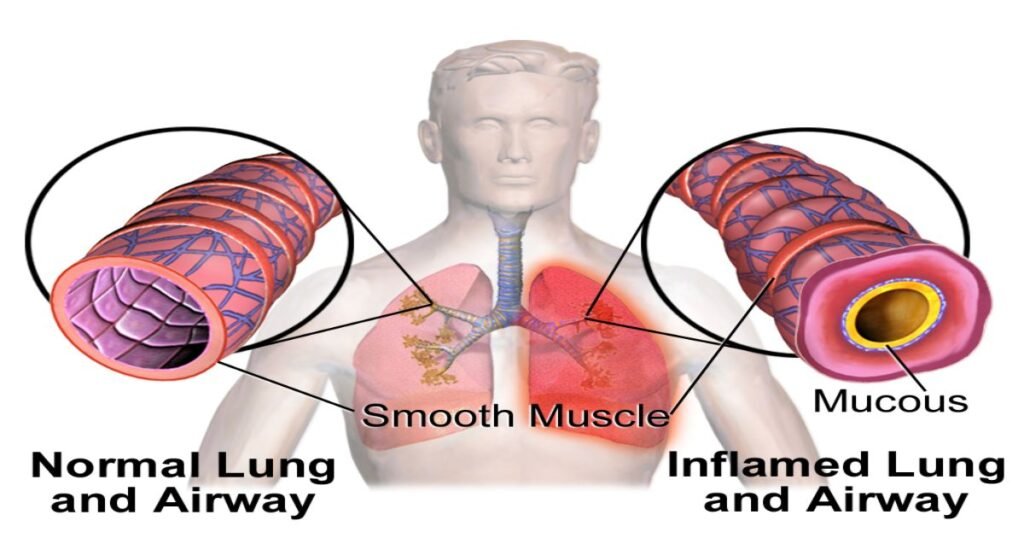Overview:
Asthma is a chronic respiratory condition that affects millions of people worldwide. It causes inflammation and narrowing of the airways, making breathing difficult.
Asthma can affect people of all ages and ranges in severity from mild to life-threatening. While there is no cure for asthma, it can be managed effectively with the right treatment and lifestyle adjustments.
In this blog, we will delve into what asthma is, its symptoms, causes, risk factors, complications, diagnosis, treatment options, and prevention strategies.
We’ll also address frequently asked questions to provide a comprehensive understanding of this condition.
Table of Contents
What is Asthma?

Asthma is a chronic lung disease that leads to the narrowing and inflammation of the airways, making it difficult for air to move in and out of the lungs.
The inflammation causes the airways to become sensitive, and they react to certain triggers, leading to an asthma attack.
During an asthma attack, the muscles around the airways tighten, causing the airways to become even narrower, and making breathing challenging.
Asthma symptoms can vary in severity and frequency, with some people experiencing mild symptoms occasionally, while others may have frequent, more severe attacks. Asthma can occur at any age, though it often begins during childhood.
Symptoms of Asthma

Asthma symptoms can vary from person to person and may not always occur at the same time. The most common symptoms of asthma include:
- Shortness of breath: Difficulty breathing or feeling like you can’t catch your breath.
- Wheezing: A whistling or squeaky sound when you breathe, especially when exhaling.
- Chest tightness: Feeling of pressure or squeezing in the chest area.
- Coughing: Frequent coughing, especially at night or early in the morning.
- Difficulty sleeping: Symptoms like coughing, wheezing, or shortness of breath can make it hard to sleep.
- Fatigue: Feeling unusually tired, often due to breathing difficulties.
- Increased mucus production: The airways produce more mucus, which can block airflow and worsen breathing.
- Difficulty breathing during physical activities: Exercise or physical exertion can trigger asthma symptoms, leading to exercise-induced asthma.
Causes of Asthma
The exact cause of asthma is not fully understood, but it is believed to be caused by a combination of genetic and environmental factors. These include:
- Genetics: Asthma often runs in families. If one or both parents have asthma, the chances of their children developing the condition are higher.
- Allergies: Many people with asthma also have allergies. Common allergens, such as pollen, dust mites, and pet dander, can trigger asthma symptoms.
- Respiratory infections: Viral infections, particularly during infancy and early childhood, can affect lung development and increase the risk of asthma.
- Environmental factors: Exposure to pollutants, chemicals, or tobacco smoke, particularly during childhood, can contribute to asthma development.
- Occupational exposure: Certain workplace environments with exposure to irritants like chemicals, dust, and fumes can cause asthma, known as occupational asthma.
- Airborne irritants: Pollutants such as smoke, strong odors, or chemical fumes can trigger asthma attacks in sensitive individuals.
- Weather changes: Cold air, humidity, or sudden changes in temperature can trigger asthma symptoms in some people.
- Gastroesophageal reflux disease (GERD): Acid reflux can irritate the airways and trigger asthma symptoms in some individuals.
Risk Factors for Asthma
Several factors increase the risk of developing asthma. These include:
- Family history: Having a parent or sibling with asthma increases the likelihood of developing the condition.
- Childhood respiratory infections: Children who experience frequent respiratory infections, such as bronchitis or pneumonia, are at higher risk.
- Allergies: Individuals with a history of allergic conditions, such as eczema or hay fever, are more likely to develop asthma.
- Exposure to tobacco smoke: Exposure to secondhand smoke, particularly during pregnancy or early childhood, significantly increases the risk of asthma.
- Obesity: Overweight or obese individuals have a higher risk of developing asthma due to increased inflammation in the body and reduced lung function.
- Occupational exposure: Workers exposed to chemical irritants or dust in certain industries, such as manufacturing, agriculture, or cleaning, are at higher risk.
- Gender and age: Asthma is more common in boys during childhood, but in adulthood, it is more prevalent in women.
Complications of Asthma
If left untreated or poorly managed, asthma can lead to several complications, including:
- Severe asthma attacks: Uncontrolled asthma can lead to life-threatening attacks that require emergency medical treatment.
- Airway remodeling: Chronic inflammation can cause permanent changes to the structure of the airways, leading to reduced lung function over time.
- Frequent hospitalizations: Severe asthma attacks may require hospitalization, especially if symptoms do not respond to medications.
- Respiratory failure: In extreme cases, asthma can lead to respiratory failure, where the lungs are unable to provide sufficient oxygen to the body.
- Decreased quality of life: Uncontrolled asthma can limit physical activity, leading to reduced quality of life, missed school or workdays, and emotional distress.
- Lung infections: Individuals with asthma are at higher risk of developing respiratory infections, such as pneumonia or bronchitis.
Diagnosis of Asthma
Diagnosing asthma involves a combination of medical history, physical examination, and specialized tests to assess lung function. Common diagnostic methods include:
- Medical history: The doctor will ask about symptoms, family history of asthma or allergies, and exposure to potential triggers. They will also inquire about the frequency and severity of symptoms.
- Physical examination: The doctor will listen to your lungs with a stethoscope for signs of wheezing or other abnormal lung sounds. They may also check for allergic conditions, such as eczema or nasal polyps.
- Spirometry: This test measures how much air you can exhale after a deep breath and how fast you can empty your lungs. It helps assess lung function and diagnose asthma severity.
- Peak flow test: A peak flow meter measures how well air moves out of the lungs. Low peak flow readings may indicate worsening asthma.
- Bronchoprovocation test: This test involves inhaling a substance (e.g., methacholine) that narrows the airways to determine if the airways are overly responsive.
- Allergy tests: Skin or blood tests may be performed to identify specific allergens that trigger asthma symptoms.
- Chest X-ray or CT scan: Imaging tests may be used to rule out other conditions that could cause asthma-like symptoms, such as infections or lung abnormalities.
Treatment of Asthma
Asthma treatment focuses on controlling symptoms, preventing asthma attacks, and improving quality of life. Treatment options include:

1. Medications:
- Short-acting bronchodilators: Also known as rescue inhalers, these medications (e.g., albuterol) quickly relieve asthma symptoms by relaxing the muscles around the airways.
- Long-acting bronchodilators: These medications (e.g., salmeterol) help prevent asthma symptoms by keeping the airways open for an extended period.
- Inhaled corticosteroids: These anti-inflammatory medications (e.g., fluticasone, budesonide) reduce airway inflammation and prevent asthma attacks.
- Leukotriene modifiers: Oral medications (e.g., montelukast) that reduce inflammation and prevent asthma symptoms.
- Biologics: These medications (e.g., omalizumab) are used to treat severe asthma by targeting specific immune system responses.
- Oral corticosteroids: These may be prescribed for severe asthma attacks or when inhaled medications are not sufficient.
2. Lifestyle modifications:
- Identify and avoid triggers: Knowing what triggers your asthma (e.g., allergens, smoke, exercise) can help you avoid or manage them.
- Maintain a healthy weight: Weight management can improve asthma control and lung function.
- Exercise regularly: Physical activity can strengthen the lungs and reduce asthma symptoms, though it’s important to avoid overexertion.
- Quit smoking: Smoking or exposure to secondhand smoke worsens asthma symptoms and damages lung function.
3. Asthma action plan:
Work with your healthcare provider to create a personalized asthma action plan that outlines how to manage symptoms, adjust medications, and handle asthma attacks.
4. Allergy treatments:
For people with allergic asthma, allergy treatments such as immunotherapy (allergy shots) may help reduce symptoms.
Prevention of Asthma
While asthma cannot be fully prevented, there are several strategies to reduce the risk of asthma attacks and minimize symptoms:
- Avoid triggers: Identifying and avoiding asthma triggers, such as allergens, smoke, and pollutants, is key to preventing asthma attacks.
- Maintain indoor air quality: Use air purifiers, keep your home clean, and avoid using harsh cleaning chemicals to reduce exposure to allergens and irritants.
- Get vaccinated: Vaccinations for the flu and pneumonia can help prevent respiratory infections that worsen asthma.
- Regularly monitor your condition: Use a peak flow meter at home to monitor lung function and detect early signs of worsening asthma.
- Stick to your treatment plan: Follow your healthcare provider’s recommendations and take medications as prescribed, even when you feel well.
- Exercise safely: Engage in regular physical activity, but be mindful of asthma symptoms and adjust your workouts if necessary.
Conclusion
Asthma is a complex and potentially serious condition that requires careful management and lifestyle adjustments.
Understanding its symptoms, triggers, and treatment options allows individuals with asthma to lead healthy and active lives.
While asthma cannot be cured, with the right combination of medications and lifestyle changes, it can be controlled effectively.
If you suspect you have asthma or are experiencing symptoms, consult a healthcare provider for proper diagnosis and treatment.
Maintaining a proactive approach through regular monitoring, avoiding triggers, and following your asthma action plan is essential for living well with asthma and preventing complications.
Frequently Asked Questions (FAQs)
1. Is asthma hereditary?
Yes, asthma can be hereditary. If you have a family history of asthma or allergies, you are at a higher risk of developing asthma.
2. Can asthma be cured?
Asthma is a chronic condition with no cure, but it can be effectively managed with medications and lifestyle changes to minimize symptoms and prevent attacks.
3. Can asthma go away over time?
Some children with asthma may outgrow the condition as they get older, but in many cases, asthma persists into adulthood. Even if symptoms improve, asthma can return later in life.
4. Can stress trigger asthma attacks?
Yes, stress can trigger asthma symptoms or worsen existing symptoms by affecting breathing patterns and causing airway inflammation.
5. How is asthma different from chronic obstructive pulmonary disease (COPD)?
Asthma involves reversible airway obstruction, meaning symptoms can improve with treatment, while COPD is a progressive disease that causes permanent lung damage. Asthma often starts in childhood, whereas COPD usually occurs in adults with a history of smoking or long-term exposure to lung irritants.

